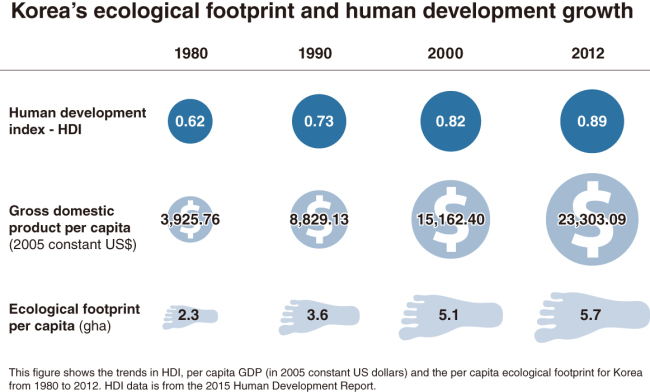Blogs
How does your footprint reflect the economy of your country, including its colonial relations?
Note: Though I wrote Canada in the title of the blog, I'm originally a Korean student who came to Canada to study, so my focus will be on South Korea's economy.
South Korea's economical footprint became similar to those of the Global North, and has been categorized into 'developed country' since the 2010s, from major international organizations such as UN, IMF, EU, OECD, and etc. Though suffering from economical crisis like most of the countries in the globe, South Korea continues to maintain gradual economic growth. Lifestyles in urban areas is almost the same as those of the Global North, and due to this, ecological footprints of South Korea continues to rise annually. This factor has an impact in my ecological footprint, and is similar to those of Edmonton (the city I currently reside). My ecological footprint is calculated to be 7.4gha, while Edmonton's footprint is 7.67gha in 2012.
The Korean Peninsula has been under Japanese colonial rule from 1910, along with partial Chinese territories such as Manchuria, south east Asian countries, and etc. Korea was freed from Japanese reign after Japan defeat in 1945. Overall, Korea has not benefited from the Japanese colonial rule. Most of Korea's economic achievements were obtained after the Korean War (1950 ~ 1953). Though industrialization and expansion of foreign trade were proceeded during the colonial rule, most of the amenities and facilities were only for the Japanese residing in the peninsula. The gap of income inequality started to become larger, and most of the products grown in Korean territories were sent to Japan. South Korea's ecological footprints skyrocketed from 1956, when a nationwide movement to expand industrial achievements, under the orders of few dictators. The increase in GDP is proportional to the increase of ecological footprints.

How are the effects of climate change related with power imbalances among countries or within countries?
A clear example of climate change related with power imbalances among countries is clearly shown in the video, Indigenous People Under Threat From Deforestation. Deforestation of Papa New Guinea didn't occur because the indigenous used it however they wanted- businesses in Malaysia (formerly Australia) has cut down the trees for their own benefit. Due to deforestation, the indigenous are gradually losing their traditional way of life. The Papa New Guineans had to sign the paper as the whites told, as they feared drafting to another war. They had a considerably weaker power over Australia and Malaysia. A power imbalance between Papa New Guinea and Malaysia/Australia led to climate change, notably the release of carbon and decrease of oxygen levels after cutting down the trees. Papa New Guinea has one of the most abundant rain-forest in this world, but if this action continues on, the country would eventually lose this valuable source of life.
Post comment
1 Comment(s)
Hi Julia,
This is a great response! I liked how you talked about South Korea's status in a lot of detail, and reflected on why and how their ecological footprint has increased with time. Have you considered how South Korea should improve/what they should do today to reduce their ecological footprint? Development to a country is really important, but so is climate change, so do you think we can strike a balance between the two? I really enjoyed reading your analysis on the indigenous peoples, and how politics, economics, and climate change are all interrelated. What's the best way to support the indigenous, while still keeping our industries (to make paper, tables...) going, sustainably? What should we do to avoid the after-effects of cutting down trees (e.g. Selective cutting, tree planting programs, cutting in certain amounts so it couldn't replenish?)
I truly commend you on your very detailed and thoughtful response.
Keep going!

Helen Chen
Sep 27, 2017